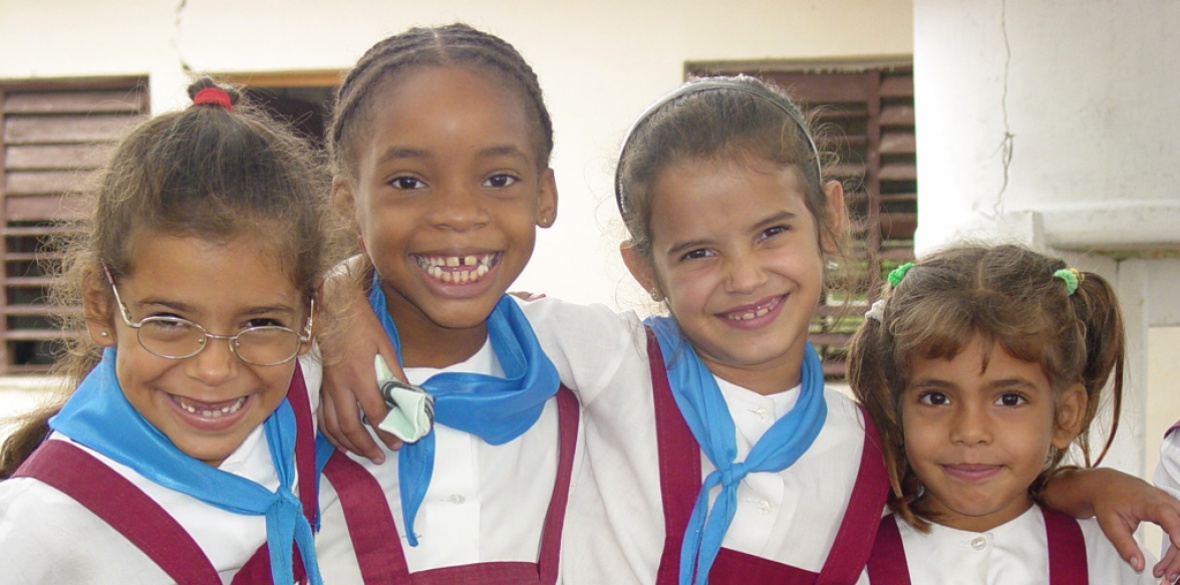Why can’t we inject a bit of Cuban flavour into the British educational system?

LAST October half-term, I was one of 24 National Education Union (NEU) members to travel to Cuba for a delegation to learn more about Cuba’s world-leading achievements in education, despite all the huge challenges from the US blockade.
On arrival in Havana, we were greeted with the warmth of the Caribbean and the rain October always brings.
We were exhausted from the journey but smiling from ear to ear, the array of 1950s classic cars lined up outside the terminal were a joyous welcome.
Our itinerary enabled us to visit a number of schools, trade unions and organisations and it was here that Cuba came to life.
Yes, the mojitos were delicious, the sunshine wonderful, but nothing could have ever prepared me for the emotions I would experience in a Cuban school.
Education in Cuba is nothing short of amazing. The educational ethos of the Cuban government stems back to 1961 when Fidel Castro declared the Literacy Campaign.
On January 1, literacy brigades were sent across the country to ensure that every Cuban could read and write.
“You will teach, you will learn,” said Castro, knowing that education was the best weapon for the future of all Cubans and to defend the nascent Cuban revolution.
Almost 57 years on and this is evident in every school. Every student wearing the same uniform, eating a nutritious meal and receiving an education the world should be envious of.
Social status and demographics do not apply when it comes to the education of Cuba’s future generations.
Every school we visited took pride in showing us the Cuban way of education, their talents in abundance.
The assemblies we were presented with, clearly and carefully planned, were breathtaking.
It was during these visits that I observed the clear effects that the blockade has on every school.
Resources are scarce, walls were bare and facilities extremely basic. There were no laptops or high-tech computer suites. Sports equipment was basic and cheaply made, musical instruments were old with replacement parts sourced from China. These pieces of equipment are exceptionally expensive and often of poor quality.
After our delegation saw the poor quality and lack of instruments first-hand in Cuba, the NEU (NUT section), in association with Cuba Solidarity Campaign and the Music Fund for Cuba, launched a Play for Cuba campaign, which is being launched at our conference in Brighton.
The Play for Cuba appeal will ship a container of new and second-hand instruments to young Cuban musicians.
Despite the huge economic challenges from the 56-year US blockade, Cuban schools get it right every time. The Cuban government spends 13 per cent of its GDP on education, the highest level on Earth. The UK spends less than 6 per cent.
There were many occasions where I was moved to tears by the passion and talent of the students before me. Not because they had so little but because they had so much.
The care, nurture and love they receive from teachers clearly demonstrated that, when combined with a first-class education, material items such as wall displays, interactive whiteboards etc are not needed to inspire a child who is excited to learn.
The Cuban recipe for education, for each individual student, demonstrated this in abundance.
To see a music teacher lovingly wrap her arms around a student who had just performed for us, tell him how wonderful he was, how proud she was, left me questioning and envious, if not a little sad. Our society has taken that physical interaction away from education facilities. It is not deemed appropriate to hug a student.
The Cubans however, feel differently. While a child is in their care, they are the parents, they are teachers. It is their job to show love, affection and help shape the future adult.
This makes perfect sense, doesn’t it? Students are in our care for the largest part of their educational life. Surely we are responsible for making sure that child feels cared for and nurtured? If my child was sad or in need of a hug, I would hope the teacher would put aside our social expectations and hug him or her.
A question was raised about mental health and wellbeing in Cuban schools. Surely with the expectations of students so high, wouldn’t this lead to a rise in stress levels and associated mental health issues?
Students have to pass rigorous tests in order to proceed through the educational system. Their progress is closely monitored by their place of education and monthly parent meetings are compulsory.
It stands to reason that student health may be compromised, doesn’t it? In England, we have seen Childline enquiries related to educational pressures increase by 35 per cent since 2016.
The teacher looked confused by this question. She responded by asking why the students would have mental health problems caused by educational pressures.
Students are taught that they can only do their best. The students and their families receive support and assistance throughout their educational life. The students are taught that education is the only way they can fight the blockade and support their communities as an adult. Students are genuinely excited to learn.
We are one of the richest countries in the world and yet our students are hiding behind the shadows of tests and the worry of poor scores. We teach them to do their best, be the best that they can be, yet they are still filled with fear.
My visit left me questioning — if the Cubans can be so successful with so little, what is stopping us from implementing a little Cuban flavour over here? Even if we do just offer “that” child, the child that you know needs it most, a hug.
It was an honour to be a part of this delegation and I urge all NEU members to apply to attend the October 2018 half-term delegation to Cuba.